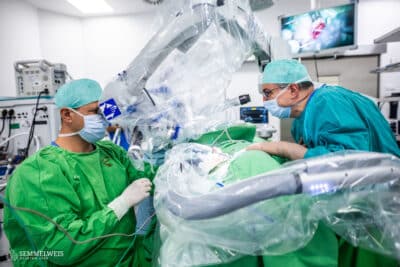Physical activity has a positive impact on almost all our organ systems. It has been proven to reduce blood pressure and cholesterol levels as well as help prevent coronary artery disease. It improves insulin sensitivity, which is particularly important in the prevention and treatment of type 2 diabetes, and it even plays a role in preventing certain tumorous diseases.
 It can alleviate the symptoms of menopause, help prevent osteoporosis, and generally slow down aging. Regular exercise improves the body’s fat-to-muscle ratio, reduces stress, and is also important in preventing depression, Dr. Hajnalka Vágó emphasizes. However, the large comprehensive epidemiological and clinical studies of the past decades have provided evidence that regular exercise is not only effective in preventing disease, but also as part of therapy. So-called high cardiorespiratory fitness, for example, was shown in a study published in the British Journal of Sports Medicine to reduce the risk of all-cause mortality by nearly 20 percent, thus significantly improving life expectancy. Beneficial changes in the body that result from regular exercise and improved fitness have also been shown to improve life expectancy in people with chronic diseases, Dr. Hajnalka Vágó points out.
It can alleviate the symptoms of menopause, help prevent osteoporosis, and generally slow down aging. Regular exercise improves the body’s fat-to-muscle ratio, reduces stress, and is also important in preventing depression, Dr. Hajnalka Vágó emphasizes. However, the large comprehensive epidemiological and clinical studies of the past decades have provided evidence that regular exercise is not only effective in preventing disease, but also as part of therapy. So-called high cardiorespiratory fitness, for example, was shown in a study published in the British Journal of Sports Medicine to reduce the risk of all-cause mortality by nearly 20 percent, thus significantly improving life expectancy. Beneficial changes in the body that result from regular exercise and improved fitness have also been shown to improve life expectancy in people with chronic diseases, Dr. Hajnalka Vágó points out.
If your attending doctor allows or specifically recommends regular exercise, you should definitely follow this good advice as it may even slow down the progression of your disease. – Dr. Hajnalka Vágó
The cardiologist and professor of sports medicine cites the example of intervention or surgery for coronary artery disease, after which it is recommended to start low to moderate-intensity exercise as part of rehabilitation early on. In the case of stable coronary artery disease, a minimum of 150 minutes of regular moderate-intensity exercise per week is recommended at least three days a week, but it may even be spread over six to seven days.
According to the recommendation of the European Society of Cardiology (ESC), a weekly minimum of 150 minutes of moderate-intensity exercise (which can be increased to 300 minutes) would be ideal, preferably spread over four to five sessions per week.
“It is also worth increasing physical activity while performing your everyday tasks – such as by doing household chores or gardening, walking at least part of the way to work if possible, or taking the stairs instead of the elevator. Unfortunately, these activities do not count as workout, but even an extra 10-15 minutes of walking a day can have a beneficial effect,” Dr. Hajnalka Vágó pointed out.
However, to stay healthy, you need to do dynamic exercises that move large muscle groups, such as walking, running, riding a bicycle, or swimming.
It is also important to maintain and improve muscular strength, which can be achieved through bodyweight exercises or weight training, for example. The significance of this and of improving coordination increases with age, when muscle mass naturally decreases and the risk of falling over grows, explains Dr. Hajnalka Vágó.
There is no physical well-being without fitness
Physical fitness means physical well-being, the state of being able to perform everyday tasks at an adequate level of fitness and energy without it being overly taxing, stressful, or tiring. However, among others, experts also distinguish between cardiovascular fitness (also referred to as aerobic capacity) and musculoskeletal fitness, which are essential for reducing the risk of morbidity and mortality. The most common way to measure fitness is by cardiopulmonary exercise testing (CPET) on a treadmill or stationary bicycle.
Éva Haiman
Translation: Dr. Balázs Csizmadia
Photo by Attila Kovács – Semmelweis University; illustration: iStock


